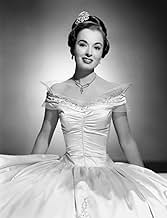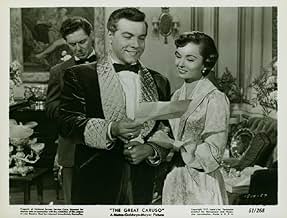The film explores the life of tenor Enrico Caruso, a vocalist who faces rejection from Musetta and Dorothy, and struggles to find acceptance in New York.The film explores the life of tenor Enrico Caruso, a vocalist who faces rejection from Musetta and Dorothy, and struggles to find acceptance in New York.The film explores the life of tenor Enrico Caruso, a vocalist who faces rejection from Musetta and Dorothy, and struggles to find acceptance in New York.
- Won 1 Oscar
- 2 wins & 4 nominations total
- Antonio Scotti
- (as Paul Javor)
- Caruso (as boy)
- (as Peter Edward Price)
- Director
- Writers
- All cast & crew
- Production, box office & more at IMDbPro
Storyline
Did you know
- TriviaThis was the next-to-last completed MGM film under Louis B. Mayer's supervision (the last was Show Boat (1951), released in the summer of that year). A proxy fight soon after would see him removed as the head of the studio he helped to found. He was replaced by his former chief of production, Dore Schary. Mayer ran MGM for 27 years, Schary for barely 6.
- GoofsOpening credits: The events, characters and firms depicted in this photoplay are fictitious. Any similarity to actual persons, living or dead, or to actual firms is purely coincidental. Says it ALL.
- Quotes
Enrico Caruso: It is true, Señor Barretto, that right now I sing for pennies. Pennies are not very important in a big house like this. But the singing, that is important everywhere. It makes people feel good inside, takes away the ugliness, the sadness, and it fills the empty place here. That too is something Señor, isn't it?
- Crazy creditsOpening credits: The events, characters and firms depicted in this photoplay are fictitious. Any similarity to actual persons, living or dead, or to actual firms is purely coincidental.
- ConnectionsFeatured in The Metro-Goldwyn-Mayer Story (1951)
- SoundtracksThe Loveliest Night of the Year
Lyrics by Paul Francis Webster
Music adaptation by Irving Aaronson
Also performed by Ann Blyth (uncredited)
Adapted from "Sobre las olas" (uncredited)
Music by Juventino Rosas
Like Caruso before him, and long before the Three Tenors and Andrea Bocelli, Lanza became THE tenor superstar of his generation. If there is anyone who wants to know why, just listen to him sing some of the magnificent arias in this film. "Cielo e Mar," "E Lucevan le stelle," and especially his matchless "Vesti la Giubba," are evidence enough that Lanza could, indeed, have become bigger than Caruso, had not his excesses caught up with him at such a young age.
I have just a couple of negative comments to insert here. First, the plot, while it makes for a good story, actually has very little to do with Caruso's life (Read Enrico Caruso Jr.'s "Caruso: My Father and My Family" for a good, readable biography. He even compliments Lanza and his performance!). For one thing, Caruso didn't die on stage, but several months after that last performance at the Metropolitan. Second, the "Italian" mannerisms in this movie are straight out of the Henry Armetta/"Life with Luigi" school, stereotyped to the hilt.
But, given the overall scheme of things, these are relatively minor complaints. As to the rest, I say that, for those of you who've never heard Lanza and wonder why he was so great, this film will give you ample proof. For those of you who were there when Lanza was in his prime, here's a chance to live it all over again. A great film, and a matchless tribute to TWO of the legendary voices of our time.
- How long is The Great Caruso?Powered by Alexa
Details
- Release date
- Country of origin
- Languages
- Also known as
- Der große Caruso
- Filming locations
- Metro-Goldwyn-Mayer Studios - 10202 W. Washington Blvd., Culver City, California, USA(studio: made in Hollywood, U.S.A.)
- Production company
- See more company credits at IMDbPro
- Runtime1 hour 49 minutes
- Aspect ratio
- 1.37 : 1
Contribute to this page



































